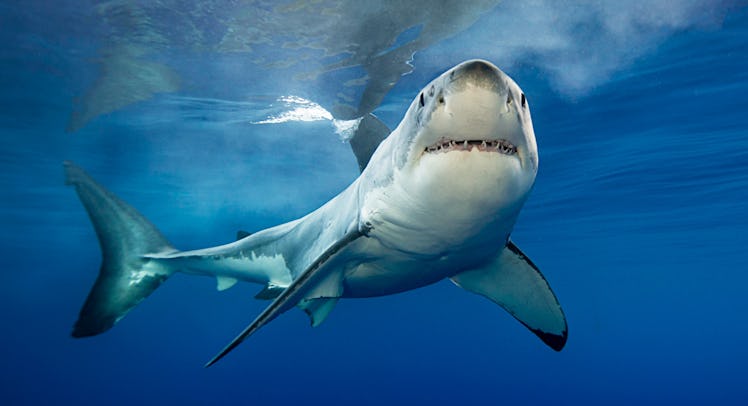Why ‘Shark Week’ Triggers Kids’ Fears In Unexpected Ways
For younger children, a trick of brain development can make Discovery Channel’s 'Shark Week' a visceral and incredibly troubling experience.

The Discovery Channel’s Shark Week continues to be a basic cable aquatic juggernaut, driving audiences that binge on shark documentaries that range from bloody to benign. This all makes sense. Sharks provoke strong reactions. They remind both children and adults that nature can be both beautiful and vicious. However, there’s a distinct difference in how kids and adults experience shark-based content. Adults can thrill to the destructive power of the shark but, according to developmental psychologist Dr. Tracy Masiello, the experience of watching a feeding frenzy is far more visceral for young kids.
To put it simply, Shark Week is likely to absolutely terrify even the most nature-oriented kids because they are not, for developmental reasons, able to take pleasure in vicarious dangers. For little kids, dangers are dangers — even when they’re just swimming around on the flat screen.
Masiello spoke with Fatherly about what Shark Week looks like for ankle biters and how parents can take advantage of the educational value of nature documentaries without terrifying their kids.
As adults, we understand that what we see on the TV cannot — electoral politics notwithstanding — hurt us. But kids don’t necessarily get that. Why is that?
Until the ages of 6 or 7, children truly do not grasp the difference between what is reality and what is fantasy. What young children see on TV seems very real to them. If they’re watching something like Shark Week, it’s common for them to believe that the sharks in the television can come out.
Wow. I can imagine that would be quite frightening.
I just recently had a child client who refused to take baths because the little guy was sure a shark was going to come into the bathtub through the faucet. His parents could not convince him otherwise no matter what they said. Unfortunately, you cannot reason a child out of their developmental stage.
What about those kids that seem really bold — the kids who swear they want to watch?
I think that’s where parents struggle sometimes. Even when kids are in that 6- to 8-year-old age range, they truly don’t grasp that distinction between what’s fantasy and what’s real. Yet they feel like they can handle it. So, it’s up to parents to be the gatekeeper. You might have an 8-year-old who seems excited for the guts and the gore. He may be calm in the moment, but refuse to go in the water the next time you go to the beach.
If parents want to let their kids watch to encourage curiosity or interest in nature, what can they do to make sure it won’t be a damaging experience?
Parents need to be mindful of the content. How is the information about sharks being conveyed to children? Parents should preview whatever it is. There is research that shows when kids are really scared of something in childhood, those fears can linger into adulthood. These shows do have a long-lasting impact.
Children are reactive to the images they see. If there is blood or a sense the shark is going to attack or eat something, that’s going to feed into their already vivid imaginations. Music sets the tone and gives a sense of anticipation or excitement or fear. Children are reactive to that. Music is designed to trigger adults and give a sense of suspense. Children are going to react to that too.
Are there ways parents can guide a child through these shows to make them feel more comfortable?
Absolutely. If something does come on that’s more scary or disturbing, don’t just turn it off. It’s actually better to talk with them about what they saw and help address those fears. If a child does see a shark ripping something’s head off, talk about it from a different perspective: ‘The sharks just having his dinner.’ It’s about normalizing and neutralizing what they just saw.
So what does a parent do? Shark Week is popular. Not letting your kid watch it could get rough.
Take them to the aquarium.
Shark Week runs this week on The Discovery Channel.